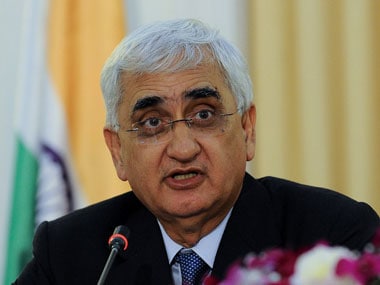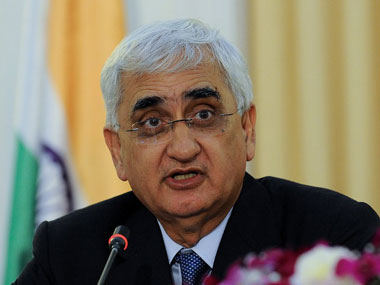London: For a minister who heads the diplomatic service, Salman Khurshid is not at his diplomatic best these days. Just about recovering from the “impotent” jibe at Narender Modi, that seems to have bruised him more than Modi, the minister dug into the Supreme Court and the Election Commission in the course of a talk on ‘Challenges Facing Indian Democracy’ at the School of Oriental and African Studies in London. His remarks may have contained more traces of truth than evidence of tact. Few dispute that the Supreme Court tends to take on quite a bit, but coming in the middle of an election campaign, after Khurshid has acquired something of a ‘watch this space’ persona, the remarks were certain to cause a stir. [caption id=“attachment_1433285” align=“alignleft” width=“380”]
 Salman Khurshid. AFP[/caption] Khurshid said essentially that the Supreme Court was interfering far too much in the conduct of an election campaign. “They’ve taken over billboards, who will put what kind of billboards, how far from road surfaces,” he said. “This is what the highest court in the country is deciding.” Even more, “the courts are now deciding who can go to parliament and who cannot go to parliament. This is not [written] law. This is judge-made law in the highest tradition of UK, so the judges sit and say this is not to happen, that is not to happen. And of course go to the extent of threatening contempt proceedings against officials and against parliamentarians.” Khurshid spoke of these Supreme Court moves to control an election as a part of a court tradition of deciding too much: “What kind of fuel will be used in the national capital region of Delhi, will it be fossil fuel, will it be diesel, will it be petrol, will it be LNG…the courts are now deciding.” His separate listing of fossil fuels was unfortunate, because petrol, diesel and LNG are fossil fuels. Much of Khurshid’s critique was of a rather simple — and numerical — nature. “We have 31 judges in the Supreme Court,” he said, “and 543 parliamentarians.” Those 31 judges, he said, “never sit in benches which have more than two or three judges. Sometimes you have a constitutional bench of five. Very, very rarely, because five have said something, so they need seven to look at it, once in a blue moon, once in 20 years, seven becomes ten or 11, and only once in the history of our Supreme Court have 13 judges sat together, that was about 30 years ago, we law students are still trying to work out what 13 of them said when they sat together.” Almost invariably, he said, “two of 31 decide what should happen. There is no way you can go beyond those two to three or four or five except in very unusual circumstances. So two can say something about parliamentarians being tried or not being tried, being allowed to be able to contest elections or not to be able to contest elections and what kind of affidavits they have to file, what it is that they can say, and what it is they can do and so on.” Speaking to Firstpost in London Thursday, Khurshid denied he had ‘slammed’ the Supreme Court as some headlines in India had suggested he had. “I praised them for doing things that the politicians are not able to do. But if they make mistakes, I have to say they make mistakes, you know.” “I have been arguing for a long time that because of paucity of time, and compulsions of the number of cases, the courts have to break up into benches of two. So what two decide, three can change, what three decide five can change, what five decide seven can change, and so it goes on. You don’t have certainty in the law. That’s important. This is a reform that is necessary…That’s all I said, people don’t understand.” Khurshid’s criticism of the Election Commission was along similar lines – that it was stepping beyond reasonable limits on what it could expect to rule on, and, as with the Supreme Court, along quite simple numerical lines. India has, he said, “a very, very vigorous Election Commission, which is highly, highly respected in the country. I must say they have done yeoman services, undoubtedly they’ve cleaned up the election process, they have sorted out a lot of the ugly warts of our election process. But they are again only three of them. With no appeal from them. And three of them can decide what word you can use in an election campaign.” Recent instructions from the Election Commission, he said, rule that “our manifesto must be certain that it doesn’t offer the building of roads. Because promise of building of roads distorts democratic decision. That we should also not offer drinking water. Because that distorts decision-making. As I understand, the broad philosophical approach is that you should do and say nothing that wins you an election. You should try your best to lose elections.” Khurshid added: “Cheekily, I said to them we do that for five years, but give us 15 days in which we can try and win it. That’s an interesting area of study, how much can election commissions interfere in public discourse.” As arguments, some may well have a fair degree of validity. But few doubt, as Khurshid acknowledged, that the Supreme Court and the Election Commission each have made pioneering breakthroughs in progress. Khurshid acknowledged that, but the examples he cited of the actions of each were of ridiculous extremes of the consequences of some of their decisions. Sitting uneasily in the lap of several other controversies, it may have been less than diplomatic to court this one now.
Salman Khurshid. AFP[/caption] Khurshid said essentially that the Supreme Court was interfering far too much in the conduct of an election campaign. “They’ve taken over billboards, who will put what kind of billboards, how far from road surfaces,” he said. “This is what the highest court in the country is deciding.” Even more, “the courts are now deciding who can go to parliament and who cannot go to parliament. This is not [written] law. This is judge-made law in the highest tradition of UK, so the judges sit and say this is not to happen, that is not to happen. And of course go to the extent of threatening contempt proceedings against officials and against parliamentarians.” Khurshid spoke of these Supreme Court moves to control an election as a part of a court tradition of deciding too much: “What kind of fuel will be used in the national capital region of Delhi, will it be fossil fuel, will it be diesel, will it be petrol, will it be LNG…the courts are now deciding.” His separate listing of fossil fuels was unfortunate, because petrol, diesel and LNG are fossil fuels. Much of Khurshid’s critique was of a rather simple — and numerical — nature. “We have 31 judges in the Supreme Court,” he said, “and 543 parliamentarians.” Those 31 judges, he said, “never sit in benches which have more than two or three judges. Sometimes you have a constitutional bench of five. Very, very rarely, because five have said something, so they need seven to look at it, once in a blue moon, once in 20 years, seven becomes ten or 11, and only once in the history of our Supreme Court have 13 judges sat together, that was about 30 years ago, we law students are still trying to work out what 13 of them said when they sat together.” Almost invariably, he said, “two of 31 decide what should happen. There is no way you can go beyond those two to three or four or five except in very unusual circumstances. So two can say something about parliamentarians being tried or not being tried, being allowed to be able to contest elections or not to be able to contest elections and what kind of affidavits they have to file, what it is that they can say, and what it is they can do and so on.” Speaking to Firstpost in London Thursday, Khurshid denied he had ‘slammed’ the Supreme Court as some headlines in India had suggested he had. “I praised them for doing things that the politicians are not able to do. But if they make mistakes, I have to say they make mistakes, you know.” “I have been arguing for a long time that because of paucity of time, and compulsions of the number of cases, the courts have to break up into benches of two. So what two decide, three can change, what three decide five can change, what five decide seven can change, and so it goes on. You don’t have certainty in the law. That’s important. This is a reform that is necessary…That’s all I said, people don’t understand.” Khurshid’s criticism of the Election Commission was along similar lines – that it was stepping beyond reasonable limits on what it could expect to rule on, and, as with the Supreme Court, along quite simple numerical lines. India has, he said, “a very, very vigorous Election Commission, which is highly, highly respected in the country. I must say they have done yeoman services, undoubtedly they’ve cleaned up the election process, they have sorted out a lot of the ugly warts of our election process. But they are again only three of them. With no appeal from them. And three of them can decide what word you can use in an election campaign.” Recent instructions from the Election Commission, he said, rule that “our manifesto must be certain that it doesn’t offer the building of roads. Because promise of building of roads distorts democratic decision. That we should also not offer drinking water. Because that distorts decision-making. As I understand, the broad philosophical approach is that you should do and say nothing that wins you an election. You should try your best to lose elections.” Khurshid added: “Cheekily, I said to them we do that for five years, but give us 15 days in which we can try and win it. That’s an interesting area of study, how much can election commissions interfere in public discourse.” As arguments, some may well have a fair degree of validity. But few doubt, as Khurshid acknowledged, that the Supreme Court and the Election Commission each have made pioneering breakthroughs in progress. Khurshid acknowledged that, but the examples he cited of the actions of each were of ridiculous extremes of the consequences of some of their decisions. Sitting uneasily in the lap of several other controversies, it may have been less than diplomatic to court this one now.
Undiplomatic move: How Salman Khurshid took on SC, EC
Sanjay Suri
• March 13, 2014, 20:29:12 IST
Khurshid said essentially that the Supreme Court was interfering far too much in the conduct of an election campaign. “They’ve taken over billboards, who will put what kind of billboards, how far from road surfaces,” he said. “This is what the highest court in the country is deciding.”
Advertisement
)
End of Article